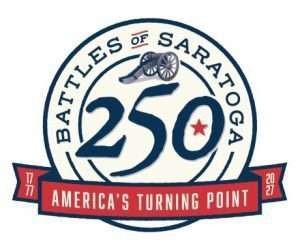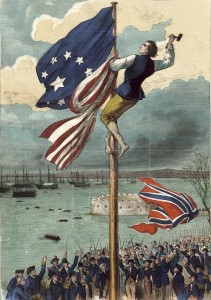
Are you counting the days? Actually, the American Revolution 250th is already here. 1774 was the year of the First Continental Congress. It was a time when colonists began to take sides for the record as rebel or loyalist. Families would be divided. Neighbor would be against neighbor. The war was underway except for the fighting. So what are you doing to remember the 250th anniversary of 1774?
What are you doing for the 250th? The following is not a comprehensive report on what is going on throughout the country. That would be too big a topic for a blog and I don’t know the answer to that question either. What I can is report on some events which I know about from in-person, newsletters (both print and email), and announcements.
NATIONAL AND THE 250TH
STATES AND THE 250TH
Let’s look at what some of the states are doing.
Virginia
The following comes from the Commonwealth of Virginia where they take the American Revolution 250th seriously.
The Virginia Department of Historic Resources received $20,000,000 in the 2024-2026 Virginia Biennial Budget to initiate a grant program to support improvements at significant historic sites and history museums in Virginia in anticipation of the 250th anniversary of the American Revolution and the 1776 United States Declaration of Independence
Fund Establishment Language
“Out of the amounts in this item, $20,000,000 the first year from the general fund is provided to establish a competitive grant program to support improvements at significant historic sites and history museums in Virginia in anticipation of the country’s Semiquincentennial. The department shall develop guidelines and establish procedures for awarding this funding, which shall include eligibility criteria for applicants, a minimum one-third match from grantees, and any other criteria the department determines reasonable to carry out the provisions of this paragraph. Of the amount authorized, the department is authorized to recover costs incurred in administering this program. Any balances for the purposes specified in this paragraph which are unexpended on June 30, 2025, shall not revert to the general fund but shall be carried forward and reappropriated.”
Eligibility is not limited to properties related to the American Revolution. Any historic site or museum that meets all the requirements is eligible to apply.
This webpage has been created to provide communications regarding the administration of this program within the Department of Historic Resources. Please check this webpage frequently as we will be making updates as we launch this new grant program.
The Preapplication is open now and linked here.
Grant Timeline
July 16, 2024—Preapplication opens
August 30, 2024—Preapplication closes
September 9, 2024—Full application released (for applicants with an eligible preapplication)
October 14, 2024—Full application deadline
Late 2024—Grant Awards Announced
Grant Guidelines
The grant guidelines document is linked here. Please read through it thoroughly before filling out a preapplication.
Application Process
The first step in the application process is the Virginia 250 Preservation Fund Preapplication. The form will help determine if the project meets minimum eligibility requirements as set out in the budget and grant guidelines. The Preapplication is due by August 30th, 2024.
The full application will open to applicants notified that they have an eligible preapplication on September 15th, 2024. This application will be completed on DHR’s WebGrants page (website currently under construction). Please see grant guidelines for additional information.
Virginia appears very serious about the 250th. The state has allocated real money on behalf of the event. How does this compare to what your state is doing?
New Jersey
My local newspaper in New York had a big article on what New Jersey is doing. In the fall of 2022, the Governor announced a $25 million plan to improve 10 Revolutionary War sites. However implementation has been slow. Roger Williams, historian for the New Jersey Society of the Sons of the American Revolution, said:
So far, Virginia, Massachusetts, and South Carolina are all doing a better job of planning and touting their efforts to commemorate America’s birth.
Sara Cureton, executive director of the New Jersey Historical Commission, said RevolutionNJ has been working behind the scenes with an association of history museums and groups to develop a variety of programs to make America 250 “a whole state experience.” A manual has been distributed on how to plan events. The big event is the Battle of Trenton on December 26, 2026. New Jersey should be at the head of the table according to state historians and government officials so one expects the pace will pick up in 2026 as people plan their heritage vacations.
Connecticut
On the H-Connecticut internet list serve, Connecticut posted the following announcement to members. (Does your state have one?)
ConnecticutHistory.org: Call for 250th Related Content
ConnecticutHistory.org invites prospective authors to submit pitches for content related to the themes developed by the America 250 | CT Commission for the United States’ Semiquincentennial (250th) anniversary. Proposed content does not need to be strictly about the American Revolutionary period, but should consider how its questions of freedom, representative democracy, and societal change continue in other aspects of Connecticut history. We are looking for pitches for the following types of content:
Encyclopedic Entries: Simple, straightforward description of the basic facts or life story of an important person, event, group/organization, or place in Connecticut. We are especially interested in entries that focus on diverse aspects of Connecticut’s history that are not yet included on ConnecticutHistory.org.
Interpretive Articles: Concise, compelling narratives that explore some aspect of Connecticut’s history. Examples include, but are not limited to:
- How the history of a particular event has been documented and remembered
- Using specific collections or artifacts to explore aspects of Connecticut history
- Analysis of data sets like census records, population data, or other compiled information
Digital Projects: Creative, born-digital ways of communicating or analyzing an aspect of Connecticut’s history. Examples include, but are not limited to:
- StoryMaps
- Interactive timelines
- Mapping projects
All accepted authors are compensated for their published content. Encyclopedia entries (approx. 350-1,000 words) are compensated at $150 and interpretive articles (approx. 500-1,200 words) at $200 each. Digital project compensation is determined after discussion and is based on the scope of the project. All content is expected to be well-researched, factually accurate, and offer balanced, authoritative historical interpretations.
Pitches
Pitches should be 1-3 paragraphs in length and include a description of the topic, form of proposed content (encyclopedic entry, interpretive article, or digital project), and how it connects to one (or more) of the America 250 | CT themes. If you would like to contribute but do not have an idea to pitch, please contact us expressing your interest—we can provide options and content gaps that we would like someone to develop!
Please submit your pitches via email to connecticuthistory@cthumanities.org. Pitches are accepted on a rolling basis and submission is not guarantee of content acceptance.
America 250 | CT Themes
Tell Inclusive Stories: The 250th serves as inspiration for the people of Connecticut to deal with and share stories that represent all of its people, past and present.
Power of Place: Connecticut is comprised of 169 towns and cities, five recognized tribes, and countless communities with unique identities and contributions.
Doing History: Inviting audiences to engage with historical methods can help them become more comfortable with the ambiguous, contested, and always-evolving nature of history.
For the Common Good: The 250th anniversary offers an opportunity to reconsider the origins of our government, democratic institutions, and broader civic life, and a chance to reflect on the ways we have changed them over time.
For more information on the themes and the America 250 | CT Commission, please see this planning guide resource.
This announcement seems like an excellent way to engage the entire Connecticut community in the 250th. One hopes that CT Humanities is geared up to handle the submissions and the state website is ready to go.
Utah
Utah is not an Atlantic coastal state and did not participate directly in the American Revolution. That does not mean that nothing was happening in the state in 1776. It was the time when Fray Fransisco Atanasio Dominguez and Fray Silvestre Vélez de Esclante led an expedition through the Rocky Mountains and Utah in search of a route from Santa Fe to Monterey, California. The Spanish and Mexican members of the expedition were the first Europeans to enter the state.
In 1976, the Utah Historical Society published The Peoples of Utah. Now the Historical Society will revisit that publication to widen the lens of the people to be included. The new publication will include people who were not included in the first one plus the people who have arrived since then. It seeks to share the story of Utahns to foster a sense of engagement and belonging among everyone who calls the state “home” and to include their stories as an integral part of America’s ongoing journey.
New York
New York has authorized the creation of a state commission. That is a requirement for the disbursement of federal funding in the event there should be federal funding. The commission itself is not fully staffed as the Governor has declined to designate her appointees. It also has no money.
A public meeting was held at NYS Museum anyway. Most of the meeting had to do with establishing the rules whereby the commission will operate. The October meeting may have something more substantive.
New York Counties
Various counties are doing things in addition to Saratoga and Westchester which I have written about before.
Clinton County
Clinton County held is first steering committee meeting in 2022. The effort now includes local historians, arts and cultural organizations, museums, libraries, local media, municipalities, researchers along with the DAR, SAR, and Battlefield Memorial Gateway Park. The Battle of Valcour Island (Arnold was still a hero then!) figures prominently in the planning. The Clinton County Historical Association doesn’t provide any financial information or events yet. It will have a Planning Manual and Toolkit for individual organizations. A county master calendar will be created. The programs and events are expected to begin in 2025.
Putnam County
I recently attended a meeting of the Putnam County 250th. It is following in the path of Clinton County as the meeting I attended included a wide range of people not solely from history organizations.
Fort Ticonderoga
Fort Ticonderoga is not a county but I am including it here. Fort Ticonderoga Launches America’s 250th Commemorations
“A Revolutionary Anthology,” Fort Ticonderoga’s five-year-long commemoration of the 250th anniversary of the founding of the United States, opened June 27 with the first of five annual exhibitions. The 2024 exhibition, “Power of Place,” will be on view through October 27. “We’re absolutely thrilled to unveil the first in the series of 250th anniversary exhibitions,” Fort Ticonderoga’s president and CEO, Beth Hill, said at the June 27 opening. “It has been a decade in the making, if not longer.”
According to Hill, the exhibitions and complementary programming will enable visitors to Fort Ticonderoga to understand the people and the events of the American Revolution through new perspectives, including those of ordinary individuals who experienced the momentous events of the Revolution in their personal lives.
“Rare artifacts, tactile experiences, public tours, and a robust digital presence with audio and video content will ensure universal accessibility and an enhanced understanding of the Revolution’s significance for all guests,” said Hill.
“Power of Place” has as its theme the influence of geography on history, said Dr. Matthew Keagle, Fort Ticonderoga Curator. “Geography shaped the Revolutionary struggle in ways that gave places far from population centers a profound significance and had a lasting effect on individuals as well as nations,” said Keagle, who said the exhibition explores nine places that played a critical role in the conduct of the Revolutionary War, the Champlain Valley included.
This year, Fort Ticonderoga’s living history programs will explore daily life at Fort Ticonderoga in 1774, when it was in the hands of the British. “Our interpretive programs are laser-focused on what was happening every day, week and month 250 years ago,” said Keagle. “Come back next year, and you will see something altogether different.”
In 2025, 250 years after the capture of Fort Ticonderoga by Ethan Allen, Benedict Arnold and the American irregulars known as the Green Mountain Boys, America’s first victory in its war for independence will be featured. And every year, other artifacts will be displayed, enabling Fort Ticonderoga “to explore the breadth, the complexity, and the diversity of the experience of the American Revolution as it unfolded over several years,” said Keagle.
New York City Boroughs/Counties
To the best of my knowledge there is no New York City American Revolution 250th committee.
To the best of my knowledge none of the five boroughs have an American Revolution 250th committee.
To the best of my knowledge there are no American Revolution 250th activities beyond what is normally done annually (THE FIRE WORKS!) or what an individual organization is planning.
The failure of New York City can easily be shown in comparison to what is being done elsewhere.
1 Remember the Boston Tea Party event last December? That was a big media and tourist spectacular supported by the state, the city, and a slew of history organizations. A great deal of planning went into the event.
What about the toppling of the statue of King George III in lower Manhattan? Is there any reason why that could not be made in a major event comparable to the Boston Tea Party event?
2 What about the Battle for New York/Brooklyn/Long Island? Many sites are gearing up to military battles which occurred at their location. Meanwhile New York City arguably has biggest battle of 1776 when 30,000 British troops landed in Manhattan and remained for seven years. Without the occupation of New York City, Burgoyne’s three-pronged attack that was stymied at Saratoga never would have happened. There are people who commemorate the battle annually but that is as a local event, not a tourist event that would draw people from around the country.
3 What about the mini-battles surrounding New York City? For example Westchester County will celebrate the Battle of White Plains in October 2026 but what about the Battle of Washington Heights at Fort Washington.
These examples contrast what New York City is not doing compared to what other areas are doing. What the city is doing is celebrating the Tall Ships. This will be a big extravaganza in early July 2026 with ships from multiple countries. A great deal of planning and effort is going into making it happens. The fact that it has nothing to do with the American Revolution is irrelevant. It will be a great show. As for the ships bringing the 30,000 British troops to occupy the city, who cares.
This blog demonstrates the wide range of responses to the 250th. There are states which have put their money where their mouth is and states which have done nothing. There are counties which have or are planning ambitious programming and counties which have done nothing. There are sites which have undertaken significant projects and sites which are crying for leadership and funding. Meanwhile the clock keeps ticking. The 250th anniversary of 1774 will be drawing to a close soon so if nothing is planned it is probably too late now.







